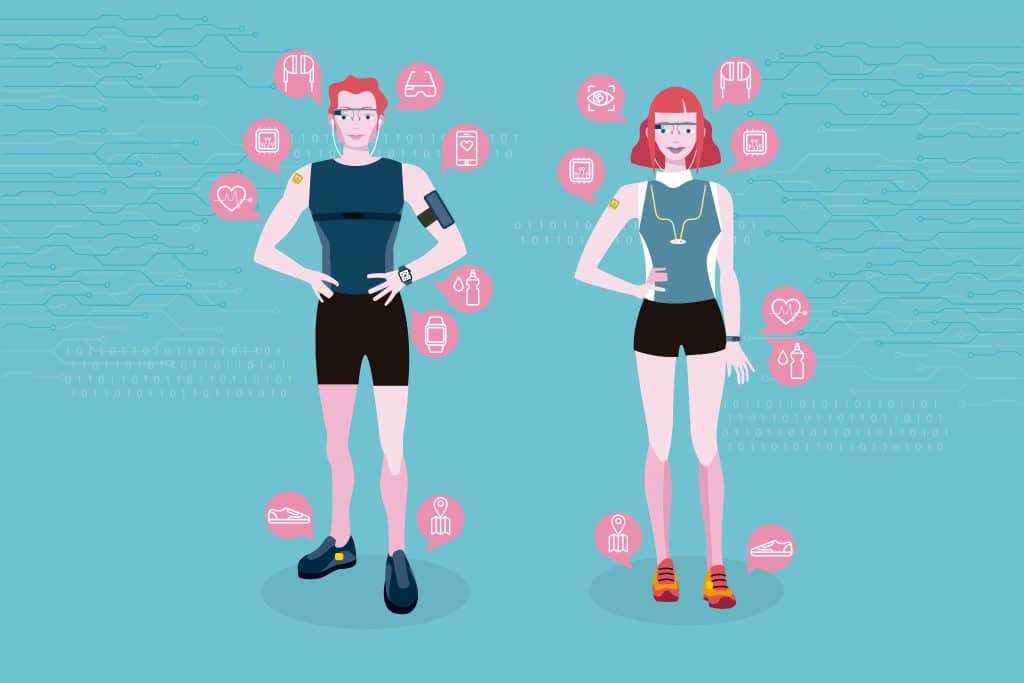Our world has undoubtedly gone digital, and healthcare isn’t far behind. Just as cassette tapes and CDs have been replaced by digital streaming platforms, blood pressure cuffs have been replaced by wearable devices like Apple Watches and Fitbits. These technologies were inconceivable in the time of their predecessors, leading many to wonder what aspects of our lives today will be digitally transformed tomorrow.
For years, physicians, oncologists, and neurologists alike have utilized expensive and invasive procedures, such as biopsies, cerebrospinal fluid extractions and analyses, and positron emission tomography scans, to visualize physiological changes that indicate the presence of cancer or neurological diseases like Alzheimer’s. But what if this could also be accomplished digitally? The solution lies in the concept of digital biomarkers, and it’s this concept that may pave the way to further digital adoptions in healthcare.
Let’s explore digital biomarkers, current applications, and what digital biomarkers mean for advancing healthcare.
Biomarkers, or biological markers, are an integral part of clinical practice as well as biomedical research. Biomarkers refer to measurable characteristics that can be utilized to indicate the presence and severity of a disease or condition reliably and accurately. For example, biomarkers for cancer include genes and genetic variations, differences in mRNA and/or protein expression, and metabolite levels, while biomarkers for Alzheimer’s disease include beta-amyloid plaques and hyperphosphorylation of tau.
While traditional biomarkers are the heart of disease measurement diagnostics today, digital biomarkers represent the future. Digital biomarkers are objective and quantifiable physiological and behavioral data that are collected and measured via digital devices, such as portables, wearables, implantables, and digestibles. The widespread usage of wearables and portables has generated massive amounts of health data, providing healthcare with entirely new classes of medical information. Digital biomarkers have the potential to provide new and actionable insights into the biological states of individuals while enabling more comprehensive health monitoring and early disease identification. They also have the potential to enable more efficient and effective research studies and clinical trials.

As the collection of digital health data continues to rise, researchers and healthcare providers have begun embracing digital biomarkers as a new, more efficient, and robust way to collect clinically meaningful data. When these large volumes of health data are paired with strong analytical tools, such as artificial intelligence, digital biomarkers can be leveraged to track trends and patterns for many diseases and disorders.
A wide variety of procedures and assessments that are traditionally performed in a clinic will be done digitally, creating a scalable, cost-effective, and non-invasive approach for disease diagnostics and monitoring. Due to the diverse, high-quality sensor data produced through digital devices, digital biomarkers can enable early diagnosis of many diseases while allowing clinicians to deliver more precise and efficient care.
While the path towards the widespread adoption of digital biomarkers depends on changes and improvements to healthcare’s data infrastructure and Medicare coverage of novel tools, digital biomarkers are already leaving their mark in several medical spaces, including psychiatry, oncology, and neurology. Here’s what digital biomarkers mean for advancing disease diagnostics and precision medicine.
Current techniques for psychiatric assessment are time-consuming, resource-intensive, and require trained clinicians for evaluation. The identification and development of digital biomarkers for mental illnesses and mood disorders, such as major depressive disorder, bipolar I, and bipolar II, may enable a scalable, timely, and cost-effective solution for psychiatric assessment, diagnosis, and symptom monitoring. Passive digital biomarkers collected from wearables may be able to detect mood disorders by assessing goal-directed behavior, movement, sleep disruptions, and energy levels from streams of movement data.
Digital biomarkers generated from wearables, ingestibles, image processing, body sensors, or health platforms and electronic medical records have been implemented in several cancer trials. In particular, the ability to remotely and continuously monitor patients undergoing cancer treatment provides digital biomarkers that may reflect variations in functional status, quality of life, and risk for adverse clinical outcomes. Digital biomarkers can grow the scientific understanding of cancer mechanisms and the impacts of treatments and therapies on patients, which may allow for more personalized patient care and improved clinical oncology outcomes.
Currently, physicians and neurologists rely on insufficient neurocognitive assessments or invasive and expensive procedures to diagnose and monitor neurological diseases, such as Alzheimer’s and Parkinson’s disease. Digital biomarkers will enable the field of neurology to shift from a reactive to a preventive approach regarding neurological diseases. The utilization of portables, wearables, or a combination of the two allows for diverse data streams that may provide new insights into trends, patterns, and digital biomarkers associated with cognitive impairment. Digital biomarkers have the potential to revolutionize the method for measuring brain health and may provide earlier diagnoses and thus early intervention and better health outcomes.
Altoida’s mission is to accelerate and improve drug development, neurological disease research, and patient care. To learn more about our precision-neurology platform and app-based medical device, contact us!